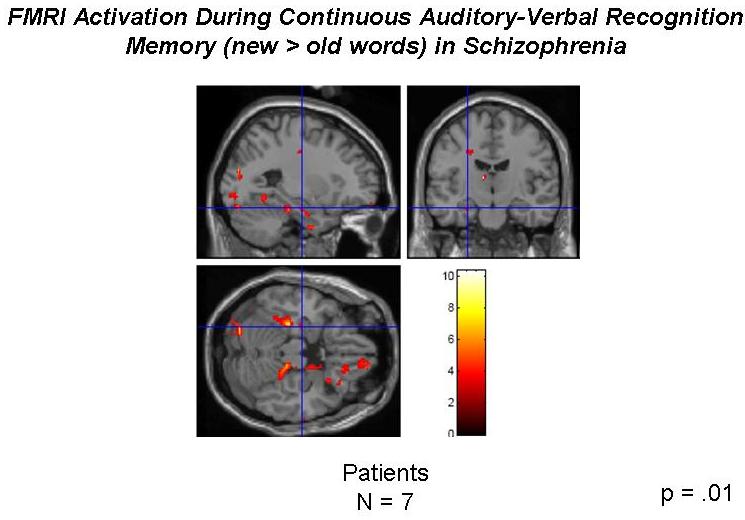Difference between revisions of "Projects:BrainActivationDuringContinuousVerbalEncodingAndRecognitionTaskInSchizophrenia"
| (7 intermediate revisions by the same user not shown) | |||
| Line 1: | Line 1: | ||
| + | Back to [[NA-MIC_Internal_Collaborations:fMRIAnalysis|NA-MIC Collaborations]], [[DBP1:Dartmouth|Dartmouth DBP 1]], [[DBP1:Harvard|Harvard DBP 1]], [[DBP2:Harvard|Harvard DBP 2]] | ||
| + | __NOTOC__ | ||
= Brain Activation during Continuous Verbal Encoding and Recognition Task in Schizophrenia = | = Brain Activation during Continuous Verbal Encoding and Recognition Task in Schizophrenia = | ||
| − | |||
| − | |||
| − | |||
| − | |||
This project employs an event-related auditory verbal episodic memory probe targeting medial temporal and DLPFC circuitry. The task uses a continuous performance format where concrete nouns are presented initially as new items. Words are then repeated after short or long intervals and the participant is required to make a new/old distinction. This design permits analysis of both encoding and recognition processes. | This project employs an event-related auditory verbal episodic memory probe targeting medial temporal and DLPFC circuitry. The task uses a continuous performance format where concrete nouns are presented initially as new items. Words are then repeated after short or long intervals and the participant is required to make a new/old distinction. This design permits analysis of both encoding and recognition processes. | ||
| − | + | = Description = | |
To date, data have been collected on 8 patients with schizophrenia and 5 healthy controls. Preliminary analysis on a subset of this data has been completed (see figure below). Sample data is available and more data will become available in year three. | To date, data have been collected on 8 patients with schizophrenia and 5 healthy controls. Preliminary analysis on a subset of this data has been completed (see figure below). Sample data is available and more data will become available in year three. | ||
| Line 14: | Line 12: | ||
''Year Three Update'' | ''Year Three Update'' | ||
| + | |||
Data collection and analysis is ongoing. Updated results are expected at the end of year three. | Data collection and analysis is ongoing. Updated results are expected at the end of year three. | ||
| − | + | = Key Investigators = | |
| − | * Dartmouth: Andrew Saykin, Robert Roth, Laura Flashman, John West, Thomas McAllister | + | * Dartmouth DBP 1: Andrew Saykin, Robert Roth, Laura Flashman, John West, Thomas McAllister |
| − | * Harvard: Martha Shenton | + | * Harvard DBP 1: Martha Shenton |
| + | * Harvard DBP 2: Marek Kubicki | ||
| − | + | = Links = | |
* [[DBP:Marek_Kubicki_visit_Dartmouth_December_20_2005|December 20, 2005: Marek Kubicki visit to Dartmouth]] | * [[DBP:Marek_Kubicki_visit_Dartmouth_December_20_2005|December 20, 2005: Marek Kubicki visit to Dartmouth]] | ||
* [[DBP:Andy_Saykin_visit_BWH_December_14_2005|December 14, 2005: Andy Saykin and Group visit to Brigham and Women's Hospital]] | * [[DBP:Andy_Saykin_visit_BWH_December_14_2005|December 14, 2005: Andy Saykin and Group visit to Brigham and Women's Hospital]] | ||
* Sample Data: https://portal.nbirn.net/BIRN/cgi-bin/DataGrid/browse.cgi?browseloc=/home/Projects/NAMIC__0003/Files/Dartmouth/HealthyControls6 | * Sample Data: https://portal.nbirn.net/BIRN/cgi-bin/DataGrid/browse.cgi?browseloc=/home/Projects/NAMIC__0003/Files/Dartmouth/HealthyControls6 | ||
| + | |||
| + | [[Category: Schizophrenia]] | ||
Latest revision as of 20:09, 27 August 2009
Home < Projects:BrainActivationDuringContinuousVerbalEncodingAndRecognitionTaskInSchizophreniaBack to NA-MIC Collaborations, Dartmouth DBP 1, Harvard DBP 1, Harvard DBP 2
Brain Activation during Continuous Verbal Encoding and Recognition Task in Schizophrenia
This project employs an event-related auditory verbal episodic memory probe targeting medial temporal and DLPFC circuitry. The task uses a continuous performance format where concrete nouns are presented initially as new items. Words are then repeated after short or long intervals and the participant is required to make a new/old distinction. This design permits analysis of both encoding and recognition processes.
Description
To date, data have been collected on 8 patients with schizophrenia and 5 healthy controls. Preliminary analysis on a subset of this data has been completed (see figure below). Sample data is available and more data will become available in year three.
Year Three Update
Data collection and analysis is ongoing. Updated results are expected at the end of year three.
Key Investigators
- Dartmouth DBP 1: Andrew Saykin, Robert Roth, Laura Flashman, John West, Thomas McAllister
- Harvard DBP 1: Martha Shenton
- Harvard DBP 2: Marek Kubicki
